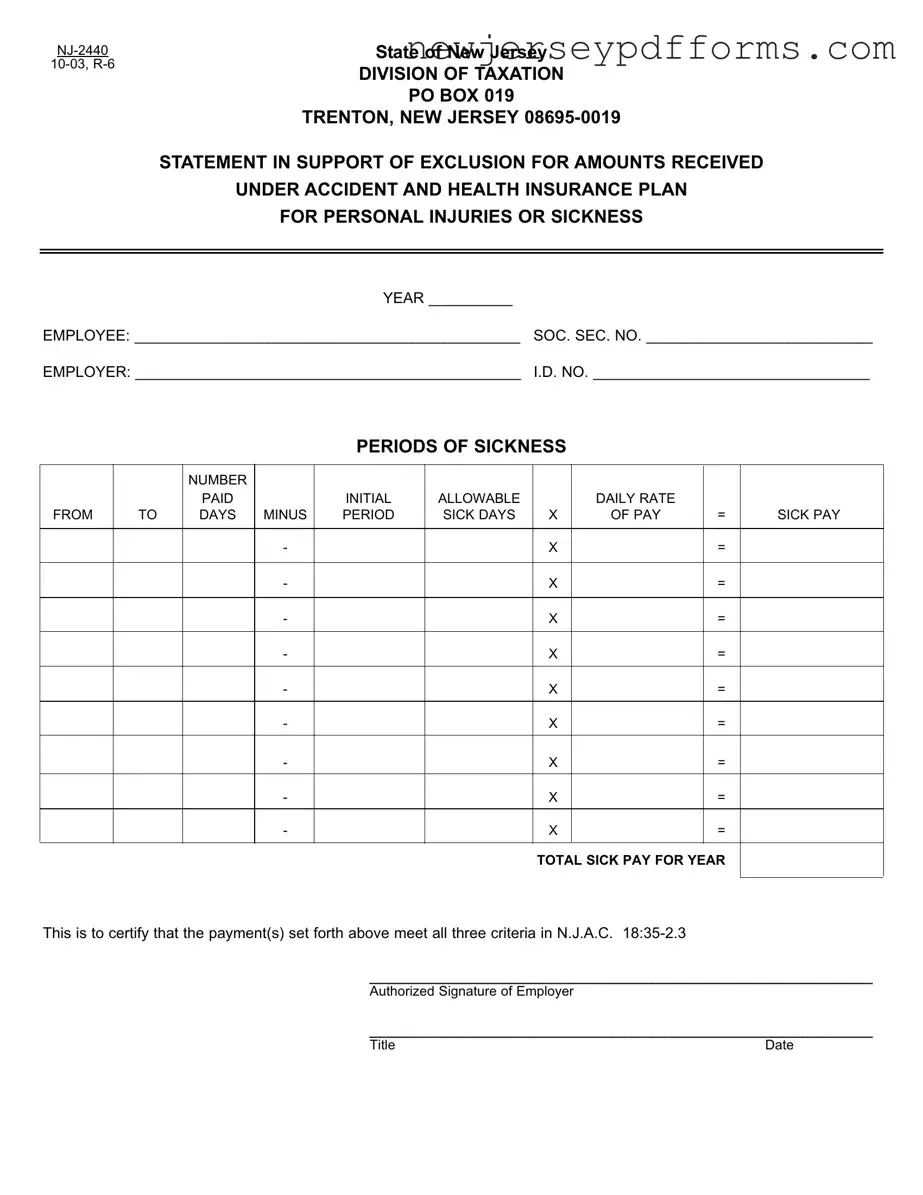The NJ-2440 form shares similarities with the W-2 form, which is used by employers to report wages paid to employees and the taxes withheld from those wages. Both documents serve as crucial components in the tax reporting process. The NJ-2440 focuses specifically on amounts received under accident and health insurance plans for personal injuries or sickness, while the W-2 provides a broader overview of an employee's earnings and tax withholdings. Both documents ensure that employees accurately report their income and understand the tax implications of their earnings.
Another document comparable to the NJ-2440 is the 1099 form, which reports income received by independent contractors and freelancers. While the NJ-2440 pertains to specific payments related to health insurance, the 1099 form captures various types of income outside of traditional employment. Both forms are essential for tax purposes, allowing individuals to report income correctly and claim any applicable exclusions or deductions, ensuring compliance with tax laws.
The NJ-2440 form is also similar to the IRS Form 8853, which is used to report Health Savings Accounts (HSAs). Both documents deal with health-related financial matters, but the NJ-2440 focuses on income received from insurance for personal injuries or sickness, while Form 8853 pertains to contributions and distributions from HSAs. Each form helps taxpayers navigate the complexities of health-related financial benefits and their tax implications.
In addition, the NJ-2440 bears resemblance to the Short-Term Disability Claim Form, which employees use to request benefits during a temporary disability. Both documents require detailed information about the employee's condition and the duration of the absence. While the NJ-2440 emphasizes tax exclusions for received payments, the Short-Term Disability Claim Form focuses on the approval and disbursement of benefits, ensuring employees receive the necessary financial support during their recovery.
To ensure a proper transfer of ownership during vehicle transactions, it's essential to have all relevant documentation in order, including a valid bill of sale. The Pennsylvania Motor Vehicle Bill of Sale form serves as a key document in this process, acting as proof of purchase and containing vital details about the vehicle and the parties involved. For those looking for a reliable template, the PDF Document Service offers an accessible solution that simplifies the drafting of this important legal document.
The NJ-2440 form is akin to the FMLA Certification of Health Care Provider form. This form is used to certify the need for leave under the Family and Medical Leave Act. Both documents require verification of a medical condition, but the NJ-2440 centers on income exclusions related to health insurance payments. They both aim to protect employees' rights, ensuring they receive the benefits they are entitled to during times of illness or injury.
Another document that parallels the NJ-2440 is the State Disability Insurance (SDI) claim form. This form is used to apply for state disability benefits when an employee is unable to work due to a medical condition. Like the NJ-2440, the SDI claim form addresses the financial impact of health issues on employees. Both forms facilitate access to benefits that help alleviate the economic burden caused by illness or injury.
The NJ-2440 is also similar to the Employer's Quarterly Federal Tax Return (Form 941). This document is filed by employers to report income taxes, Social Security tax, and Medicare tax withheld from employee wages. While the NJ-2440 focuses on specific exclusions for health-related payments, both forms are integral to the overall tax compliance framework, ensuring that both employers and employees fulfill their tax obligations.
Additionally, the NJ-2440 has similarities with the COBRA Continuation Coverage Election Notice. This document informs employees about their rights to continue health insurance coverage after leaving employment. While the NJ-2440 deals with tax exclusions for health insurance payments, both documents address the importance of maintaining health coverage during periods of transition, ensuring employees remain informed about their options.
Lastly, the NJ-2440 can be compared to the Tax Return Preparation Checklist, which assists individuals in gathering necessary documents for filing their taxes. Both documents emphasize the importance of accurate reporting and provide guidance on what information is needed to comply with tax laws. While the NJ-2440 focuses on specific exclusions related to health insurance, the checklist serves as a comprehensive tool to ensure all relevant tax documents are prepared for filing.
